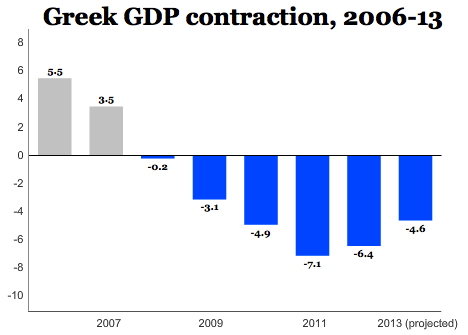Over the course of the past week, the Greek government stepped up its efforts to treat Greece’s hard-right, neo-fascist party, Golden Dawn (Χρυσή Αυγή) with the kind of speed and clarity that one rarely sees in Athens.![]()
Those efforts follow the stabbing of anti-fascist hip-hop artist Pavlos Fyssas over a week ago, which marked a turning point for the coalition government that center-right prime minister Antonis Samaras leads. Greek authorities over the weekend arrested Golden Dawn’s leader Nikos Michaloliakos (pictured above) and other party members, including party spokesman Ilias Kassidiairis, on charges of belonging to a criminal organization. It was an unprecedented action in Greece’s post-dictatorship democracy — the first time since 1974 that MPs, let alone a party head, were arrested.
But things took an awkward turn on Wednesday when three of the Golden Dawn MPs (but not Michaloliakos) arrested were released pending trial, adding to doubts that Samaras’s government is making the right choice in suddenly treating Golden Dawn as more of a criminal organization than a political organization, however vile its organizing beliefs. Kassidiaris (more on him here) did himself no favors by kicking and pushing members of the media upon his release Wednesday.
Support was already crashing for Golden Dawn in the wake of the murder — the party dropped from winning around 13% support in polls to just around 6% or 7% last week in the aftermath of the Fyssas murder. In real terms, that means that Golden Dawn would no longer be the third-largest party if elections were held in Greece tomorrow. After winning 6.92% in the previous June 2012 elections, Golden Dawn currently holds 18 seats in the 300-seat Hellenic Parliament (Βουλή των Ελλήνων), and the party had been threatening to resign en masse, leading to distracting by-elections. Golden Dawn, which began as a ‘nationalist socialist’ magazine in 1980, comprised mostly of misfit supporters of the right-wing military junta that ruled Greece between 1967 and 1974, was a very minor presence in Greek political life before — until Greece’s economy plunged into contraction, unemployment, misery and social discord over the past four years. (Read more background on the group’s history here.)
If you want to understand why Golden Dawn’s popularity has ballooned, check out the trajectory of the Greek economy from growth to severe depression over the past seven years:
 Golden Dawn was already growing into something more than a political party — a mutual aid society to provide food and other necessities (but only, of course, to ‘pure’ Greeks) and a near-paramilitary outfit that drew, according to some Greek analysts, the support of 50% of the Greek police forces.
Golden Dawn was already growing into something more than a political party — a mutual aid society to provide food and other necessities (but only, of course, to ‘pure’ Greeks) and a near-paramilitary outfit that drew, according to some Greek analysts, the support of 50% of the Greek police forces.
But Golden Dawn’s polling collapse was, even before the crackdown, good news for Samaras — right-wing voters who had flirted with Golden Dawn seemed to be returning to Samaras’s more conventional conservative New Democracy (Νέα Δημοκρατία), which has boosted it once again over the anti-austerity, leftist SYRIZA (the Coalition of the Radical Left — Συνασπισμός Ριζοσπαστικής Αριστεράς). Before the latest drama in Greece, SYRIZA had eclipsed New Democracy in many polls, even as Greece faces the humiliating prospect of requesting a third bailout from the ‘troika’ of the European Central Bank, the European Commission and the International Monetary Fund.
So why would Samaras make this push now? His sudden aggressive tack against Golden Dawn comes with the risk that Samaras will transform Michaloliakos and his party into martyrs, thereby boosting their support when they might have otherwise faded away as Greeks backed away from a group with such openly neo-Nazi leanings.
No one (yet) is talking about banning Golden Dawn outright, because that would violate Greek law, but Samaras’s government may introduce a bill to cut funding for political parties that are involved in criminal activities, an obvious attack on Golden Dawn. No one believes that Samaras’s push is quite the same as what the Egyptian military government seems to be doing in Egypt by banning what’s left of the Muslim Brotherhood (which could also backfire in unpredictable ways). But there’s still something discomfiting about the charges against Golden Dawn, which include everything from trafficking to murder to money laundering. Does the Greek government really have the evidence to back up its claims? Is Samaras just moving against Golden Dawn because he sees a political opportunity to eliminate them? Is he fearful that Golden Dawn was turning into something more sinister, or that elements of the Greek army were working in tandem with Golden Dawn to subvert Greek democracy? No one really knows for sure.
SYRIZA head Alexis Tsipras, Greece’s opposition leader, worried openly this week that Samaras is pushing to categorize a ‘theory of extremes’ that would group SYRIZA and Golden Dawn together. Though SYRIZA’s political program is far more radical than New Democracy’s, or even that of Greece’s traditional center-left party, PASOK (Panhellenic Socialist Movement – Πανελλήνιο Σοσιαλιστικό Κίνημα), which is a member of Samaras’s governing coalition, no one should be creating a false equivalence between Golden Dawn, which has used violence to intimidate journalists, immigrants and others, and SYRIZA, which has not.
But Samaras’s move against Golden Dawn has attracted the world’s attention — so the risks of failure are now amplified even more. To the extent Samaras had any credibility with domestic and international audiences, maintaining it now depends on his government’s pristine conduct.
Nikos Konstandaras at E Kathimerini puts it as well as anyone:
The stakes are high. Democracy has to show that when it defends itself against those who would undermine it, it does so with justice and transparency. The process must clearly show that it is crimes which are being prosecuted, not ideas (however foreign and distasteful they are to our society, as is the case here). It must also be clear that the authorities are doing the job well, that they will prove their case, otherwise the move against Golden Dawn may be seen as a political pogrom and work in favor of the group once its supporters’ initial shock wears off. The law must be enforced in every situation, and must be seen to be enforced, without exception. This is what society needs at this time of great uncertainty.
